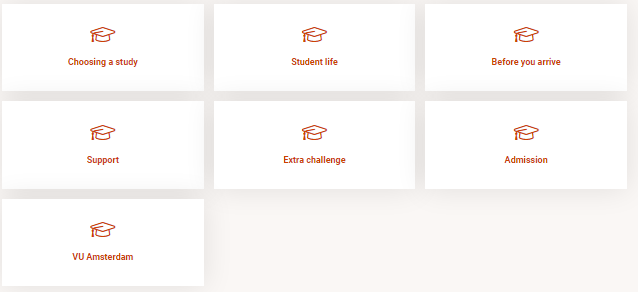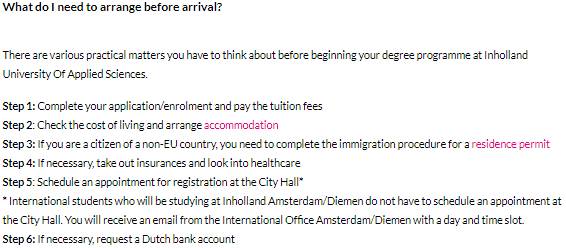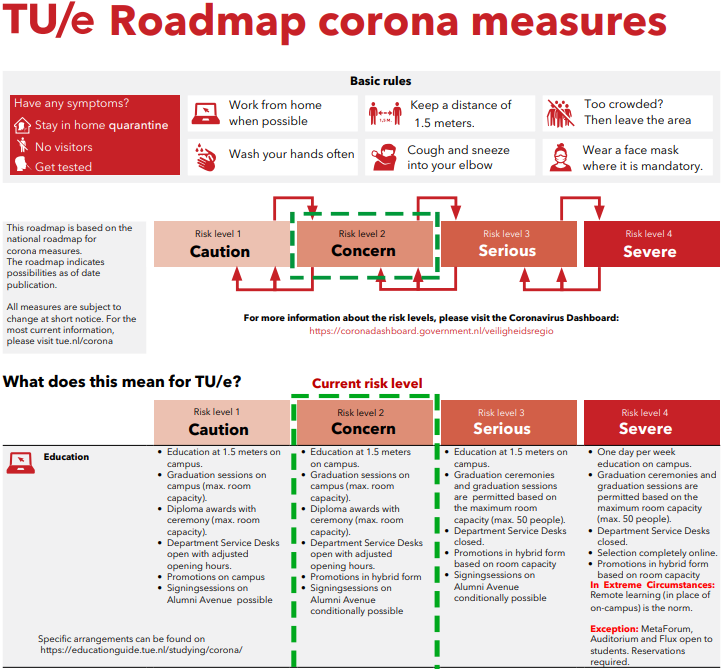The National Committee considers it important for international students to be given as much information as possible before they come to the Netherlands to study. This approach will ensure that students opting to study in the Netherlands, at a given educational institution, and in a specific study programme are making the right choice. To this end, the Committee conducts annual surveys of the provision of information to international students. This involves an assessment of the websites of six educational institutions listed in the Code of Conduct registry. This year, the selected institutions are Driestar University of Applied Sciences, Inholland University of Applied Sciences, Vrije Universiteit Amsterdam, Eindhoven University of Technology, Global School for Entrepreneurship, and Webster University Leiden. The survey focuses on the provision of key information (in terms of the Code of Conduct) for international students. This includes the accessibility of the website, the findability of the Code of Conduct, the curriculum, programme accreditation, and, finally, information about the services offered, such as assistance in finding accommodation and in registering with the local authorities. Each year, the information provided is checked against a framework of standards. You can find details of the survey report here.
As it did last year, the Committee also evaluated the provision of information about coronavirus. Although the provision of information in this regard is not explicitly addressed by the Code of Conduct, the Committee feels that it is essential for international students to be informed about any unusual circumstances, such as corona, to give them a reliable impression of the situation in the Netherlands. Accordingly, the Committee sees this as an integral component of its duty of care. Yet this survey has shown that, while some educational institutions do provide up-to-date information about corona, this is not the case everywhere. Information that translates government guidelines and measures into the local situation at the educational institution in question can help students to prepare properly.
The report has led to various recommendations and a number of best practices. The recommendations are as follows:
1. Make sure that any links to internal parts of the website or to external websites are working properly
Educational institutions are advised to check their websites regularly for compliance with this recommendation.
2. Organize corresponding items of key information into clusters, so t hat students don’t have to search the entire website to find them
hat students don’t have to search the entire website to find them
It has been noted that individual items of information are often displayed in several different parts of the website. The Committee recommends that information (such as details of the services offered by the educational institution in question) be organized into clusters. One option is to furnish part of the website with thematic tiles linked to key topics. The Vrije Universiteit Amsterdam website features a fine example of this approach. Source: https://vu.nl/en/education/bachelor
3. Offer comprehensive information on every topic covered by the Code of Conduct, rather than just a select few
The survey found that while some educational institutions do provide full details of the prescribed topics covered in the Code of Conduct, this is not the case everywhere. Step-by-step plans are an effective way of providing students with the information they need. The Inholland University of Applied Sciences website features a fine example of this approach.

Source: https://www.inholland.nl/inhollandcom/frequently-asked-questions/full-time-international-student/
4. Post details of the institution’s internal complaints handling procedure and Code of Conduct on the website
Not only should details of the institution’s internal complaints handling procedure and Code of Conduct be available on the website, it is also recommended that such information should be easily findable. Post the two video clips that are available on the Code of Conduct website on your own website. This is a simple and straightforward way of drawing the Code of Conduct to the attention of your students. The Driestar University of Applied Sciences website features a clear explanation of the Code of Conduct.
5. Clearly indicate the educational institution’s accreditation status and that of the study programme
Students from the Netherlands and elsewhere need to know whether an educational institution or study programme is accredited. In terms of awarding degrees, a lack of accreditation can have a major impact on a student’s future. It is recommended that information of this kind be displayed correctly, such that international students are fully and properly informed. The Inholland University of Applied Sciences website features a fine example of this approach.
6. Be consistent in the range of study programmes offered and with regard to the system of nomenclature used. This also applies to the programmes in the Study in Holland range
Inconsistencies in nomenclature or an inaccurate representation of the programmes themselves can create a lack of clarity about the actual curriculum. This can confuse international students and make it difficult for them to find what they are seeking. A consistent approach is recommended here, to give students a clear picture of the study programme they will be taking.
7. Be sure to provide comprehensive details of any exceptional circumstances
You are advised to adopt effective responses to exceptional circumstances, such as corona, to ensure that students are properly prepared for life in the Netherlands. The websites of Vrije Universiteit Amsterdam and Eindhoven University of Technology feature fine examples of this approach.

The Committee invites all educational institutions to critically evaluate their own websites and to assess them for compliance with these recommendations. To this end, the cases mentioned here and the best practices cited in the report can be used as suitable examples. The Committee wants the views of students to feature more prominently in the next periodic survey. To this end, it plans to consult a number of international students. After all, the question is how students perceive and process information about the curriculum, bearing in mind that many of them are unfamiliar with the Dutch higher education system.


